
Volcano the Bear was formed in 1995 with the fixed idea of being a group with uncompromising and boundless ideas, and they’ve always tried to aim for a live environment where they can do pretty much whatever they please. This results in a live show that, beyond grandiose sonic qualities, blends the very essence of key words such as surreal, shifting moods, myriad of instruments, humour, darkness, beauty - and to a certain degree even self-indulgence. That being said, these sonic transgressors are not for everyone, but if you’re a fan of free-form improvisations, free jazz, weird drones, pagan folk, whimsical acoustic pieces, disjointed percussive riffs, crackling electronics and actually own more than one record by either the Sun City Girls, This Heat, Faust, Residents, or Captain Beefheart, than you owe it to yourself to check them out.
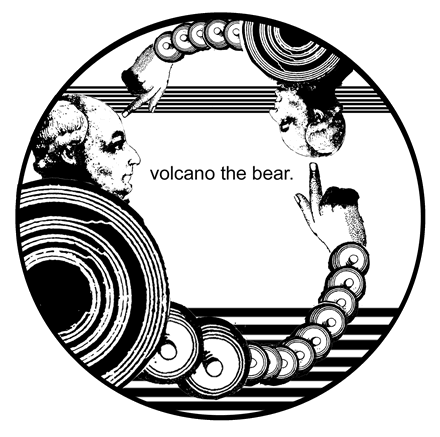
Illustration: Irmgard Mann
It’s funny how you end up seeing things differently at different occasions. When listening to Volcano the Bear live, the first thing that usually strikes me is the sonically perplexing whole, but after a while my eyes and ears tend to focus on one of the players at hand. In the live setting it’s often unavoidable that Aaron Moore, the group’s percussionist/absurdist/etc. becomes the focal point, but the more you listen and the more you engage to the sound presented you realise that all four players (Moore, Nick Mott, Daniel Padden and Clarence Manuelo) are key ingredients to what’s coming out on the other end. Today I am especially seeing Clarence Manuelo, an electronic wizard that’s capable of delivering sweeping electronics that holds the tension of living in an earthquake zone. In the context of Volcano the Bear it’s simply pure sonic euphoria, like riding a tidal wave across an ocean filled with all the aspects of improvised music that I actually like. I guess what I am trying to say is that this is a quartet so spiritually in touch with each other, that it’s never really about listening, just about pure instincts. In this case those vaguely describable instincts border perfection, or more correctly, makes me hear a surrealistic mood, nightmarish atmosphere and a joyous landscape all at once. It’s at these unexpected crossroads that these lovely absurd, crazily melodic and surprisingly organic surrealists appear at their absolute best.
I had the opportunity to team up with Volcano the Bear as a four-piece just before one of their recent Stockholm shows. Enjoy the chat that follows.
Terrascope: Tell us about the start and who was in the band. Where did you all come from, musically speaking?
Nick: Aaron and I were in a kind of more regular rock group, maybe still quite strange rock, but rock all the same. We got bored with that so we just decided to start trying to make some music that was much more loose and much more improvised and more exciting for us to play so we didn’t have to keep playing the same songs over and over again. So we kind of disbanded that group and just started making noises out of anything that made a noise, you know non-instruments, instruments and just play various things.
You basically started as a duo?
Nick: Kind of yeah, it was a duo but very quickly other people became involved.
Clarence: I met Aaron and Nick through a mutual friend called Paul Warrener. They recorded some music in his house and I was Paul’s housemate at the time so we were introduced..
Where does the band name come from originally?
Daniel: I wish it was a more interesting story…
Make something up!
Nick: It’s in the Bible…
Clarence: It’s a children’s game. Elephant bingo. Hide and seek with really complicated rules.
What sort of stuff were you listening to when forming Volcano the Bear?
Aaron: We started to get into Krautrock and free jazz…
Nick: Beefheart, Zappa, the Residents, This Heat. All the obvious things really.
Volcano the Bear was formed in 1995 with the fixed idea of being a group with uncompromising and boundless ideas. You’ve always seemed to aim for an environment where you can do pretty much whatever you please. Agreed? Is this still valid?
Clarence: Sometimes more, sometimes less. Sometimes we have this very definite idea of what we’re trying to achieve or realise. At other times it really is anything can happen.
Aaron: It’s based a lot on chance, really. It’s not very often that we have this idea for a piece of music…we’re generally stumbling around in the studio or wherever we are.
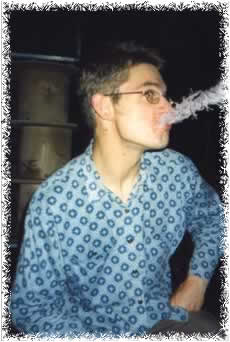 |
|
| Aaron Moore: spitting feathers... |
Isn’t it hard to keep this approach when you’ve been working together for ten years? Getting stuck in old ideas…
Daniel: We find ways of working, similar ways of working. Every now and then again, combinations of instruments turn out.
Clarence: Every day is a new day.
Daniel: But I’d like to think that we keep creating something new. You run the risk of creating something rubbish. I have played rubbish gigs, you know what I mean? That will happen but if we don’t do that then we’ll… making these decisions, taking these risks…it has to happen, it has to have the opportunity to look stupid as well.
Nick: I think very quickly after the group was formed we actually started to sound like Volcano the Bear, if that makes sense. The aesthetic probably now is exactly the same to a degree as when we started, even though I’d like to think that we have covered a lot of ground musically. I also would like to think that it has our kind of musical stamp on it and it’s because we’ve always stayed true to the music we want to do together and individually. Because of that it very quickly sounded like this, didn’t it really? Things have gotten better and some things have gone by the wayside. There was probably more in the way of the obvious rock structures to some of the early stuff.
Aaron: We’re really crap at playing rock music…
Nick: That’s why we quickly got rid of it.
I think it’s pretty strange that you cover such a wide range of influences and styles but you can really hear that a certain piece is Volcano the Bear after just a few seconds or minutes.
Clarence: That’s good.
Nick: All the groups that are the most interesting musically for me are like that. The most obvious one is Faust, they did the same thing, they covered such a broad range of stuff but it always sounded like Faust even when it was like a quirky little folk songs or some crazy industrial noise. The two things just went together and that’s just kind of what they did and their aesthetic just shines through
Daniel: You create your own musical world and you work within that and there are boundaries and edges to it. There’s a lot of room for movement in there…you can go outside it sometimes but generally you work within that.
Nick: We don’t try to play different styles though. Groups that try to play different styles don’t sound like themselves because they do a folk song or a rock song. It’s not about that.
Aaron: We’re not trying to achieve something, we are achieving it. We’re playing our personalities.
Nick: We’ve never been in a scene, never part of a scene outside of ourselves either. I think sometimes we get lumped into other groups that maybe have similar aspirations to play truthful music but we’ve never been affiliated with anyone, never part of any scene.
Clarence: I would like to labour the point once more, as a lot of other people have done, that whatever you want to call influences are obviously so much more than certain bands… it is everything, every sound and every experience and how you interpret it. From the minute you’re born and before, you’re taking it in and you’re using it and turning it into your own thing.
Daniel: This group’s manifesto is through music and it could be through painting. In this group it’s music.
Aaron: It’s much more than music as well…this whole interaction.
Nick: The limitations are a massive influence as well. Personally speaking I am not technically gifted on any instrument at all. I would never claim to be able to play the saxophone properly or do any kind of accepted sort of normal standard but I think all of us on the instruments we play… there are limitations that kind of force you to find your own individual voice.
Speaking of influences, how do you think growing up in England has influenced you?
Aaron: I would think Leicester, where we started, had quite an influence on us. Just because there wasn’t any music scene as such. There was nowhere to go to see experimental music and there was nobody playing experimental music. It could have happened anywhere that doesn’t have a scene but I think that did had an influence. I think if we were from London…there is so much more going on…you take on board all sorts of influences.
Nick: I’ve heard a number of people say to me that we’re the most English group they’ve ever seen. There are just no influences from anywhere else like American jazz tradition or…
Daniel: I think we’re definitely a very English band but within our influences there’s a lot of non-English stuff.
Clarence: Of course.
Daniel: I think it’s hard to talk about the effect of your own country because that’s all you’ve ever known. When you go abroad you can see the differences more, but what other people see as an English eccentricity or as absurd… that’s what we’re used to.
A lot of your albums strike me as being as much inspired by the landscapes, as they are dialogue. There is a strong sense of a “call and response” approach to the proceedings. What would you say characterises a good listener?
Nick: A good listener?
On stage or in the live situation.
Nick: Tuning in.
Aaron: I’ve never really thought about that saying, that you have to be a good listener to be a good improviser. I am not actually consciously aware of listening. There is something that’s connected to what’s happening but I don’t think it’s a matter of trying to fit in or comp everything that’s going on.
Nick: If you do, it wouldn’t work. It’s an instinctive thing.
Clarence: Sometimes you’re really consciously listening and sometimes you realise that you’ve been more or less subconsciously listening and sensitive to what’s going on and anticipating what’s coming next.
Daniel: There’s having awareness to what your fellows are doing.
Nick: If you think about it too much it’s a difficult thing really.
Aaron: If you think about that great drum rhythm that’s going on, start thinking about what you’re doing and it will fall to pieces
Nick: There are just little brief moments in my shows show where you maybe kind of start listening too much to what everyone else is doing and then start worrying about what you’re doing and if these fit together…and when you do listen too music it doesn’t work.
Daniel: Part of this comes from the fact we’ve been playing together for so long, for so many years. I suspect that listening with a capital L is less of an issue these days, it comes naturally. We’re so much more confident about what we’re doing. We’ve already gone though these periods of “is this music working”. We’re now at a point where it sometimes works, sometimes fails, but we’re so confident in what we’re doing that listening is just a part of that.
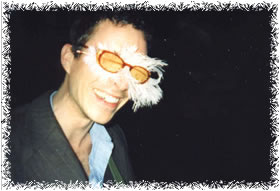 |
|
|
Daniel Padden |
A lot of improvised music strikes me as music of people that somehow are trying to hard. It’s just not moving forward and not really going anywhere.
Nick: I wouldn’t use the word typical but there’s a lot of improvised music that comes from a sort of jazz background or supposedly new music or whatever. We’re not really doing things that way. It’s more about how things fit together. Because in the matter of a few minutes time there may be a complete contrast to what we’ve just been doing and we’ll switch instruments and we’ll always have this notion of moving.
Aaron: I got a line for you...Volcano the Bear is more than the sum of its parts and as a member you have to be more than the sum of your part.
Clarence: All right.
Aaron: See you. [gigantic laughter]. That’s the spirit of Volcano the Bear!
Clarence: That Roger Doyle album we spoke about the other day is a really good example of an inspiring album. So many ideas…
Nick: It’s fantastic. It just got a little bit of everything
Daniel: Do you know the album?
Yeah, it’s amazing.
Daniel: It has this “I want to make this kind of music and I want to make that kind of music and I will” vibe to it. There’s no cohesion to the album at all. It’s all over the place.
Nick: That’s what’s great about some of the early Zappa records as well, especially “Lumpy Gravy”. There’s just loads of different things, but it has this thread running through that makes it all work. Some stupid monologue next to some classical piece next to some speeded up drums and piano. On paper it kind of shouldn’t work but it does work, and it’s just fascinating.
Aaron: It wouldn’t work on paper. Your record player wouldn’t play it.
One aspect that I think makes you different from a lot of other improvising units is that your music seems to be more about joy, happiness and good spirits, rather than pretensions.
Nick: We’re serious about it though but the end result doesn’t have to be like a lot of poe-faced listeners digging it on a poe-faced level.
Daniel: I think there’s some dark bits to it and I think there probably are some people who think we are pretentious as well but generally our attitude is very positive and it’s very joyous. Isn’t it great to have he opportunity to make music?
There seems to be a collective spirit of sorts in Volcano The Bear. How would you describe such a spirit?
Aaron: I am thinking about how we got on recently. We tolerate each other. I think most of the time we’re just talking rubbish to each other. We’re just fooling around constantly. It’s not very often that we get serious with each other. We’re more than likely to have a fart gag than to talk about improvisation…maybe that’s the spirit…we’re a bunch of fools really.
Nick: There’s a collective energy. It’s in some ways really difficult to talk about what you’re describing. It’s funny because before every show we’ll sort of maybe have a quick chat about what might happen. Inevitably someone will say that we got to listen and that we’ll do this solo or trio bit. Whatever we talk about, sometimes it happens and sometimes it doesn’t, but we have to go through that process even though we know it’s going to be kind of meaningless to a degree when we get up there. Whenever we try to talk about why certain things work, we can’t really do it so like Aaron says we’re just fooling around, have a joke. We never sit down and kind of seriously discuss why things work or how they work. It’s impossible to do it.
Daniel: There’s a spirit though, but it’s impossible to put a finger on. A lot of it has to do with confidence and trust in each other that if it all goes wrong I am happy with Aaron or Nick playing on his own for a few minutes. That’s the worst thing that can happen and if that’s the worst thing that can happen it gives you a lot of comfort to express yourself and to be creative. That’s what it is, a kind of comfort, an ease. That sounds like we don’t care about it. We care about it passionately, but I think we created this way of playing and way of expressing ourselves that is about confidence in each other.
Nick: But saying it’s easy and comforting doesn’t mean it’s not challenging. I think on both a mental and physical it’s extremely taxing and challenging.
Daniel: And exciting.
Nick: To make it easy you have to put in all the hard work we’ve done over the last eleven years or whatever and everything you’ve done. I guess that’s the essence, I suppose.
Daniel: It’s genuinely exciting being on stage in this situation. This is going to sound contradictory but it is a comfort with those risks. Things are going to happen because of the gig, this is in the live situation, but you never quite know how you’re going to react but this is something we’re relaxed about.
Nick: I’d like to say that it to a large degree depends on the audience as well. I am not saying that we haven’t done good shows with less responsive audiences but I remember a show we did in Liverpool…
Aaron:. Oh God.
Nick: The audience was just like a dance crowd basically, taking ecstasy and dance. I played about 30 seconds on this goat horn thing and somebody just shouted, “Fuck off”. That was it, I was just destroyed for the whole gig. I could not concentrate, I mean you should maybe be able to put that aside but you need people on your wavelength; you need people on your side.
Aaron: If people are not are getting it, that’s when it really gets difficult.
Daniel: It could turn a good gig into a very good gig. It’s not going to stop us from doing what we do but sometimes I think it’s about the tiny little differences in how we play that makes a gig really great. Do you know what I mean?
Clarence: It doesn’t have to be anything much, a laugh or someone shouting.
Nick: You say laughing…there’s nothing more wonderful than when people in the audience laugh. It kind of makes you realise that people are on our side.
Aaron: There is…
Nick: Sorry…there are lots of more wonderful things. It is a wonderful thing when people laugh though because it makes you realise that people are on our side and getting it.
A lot of your music has been released by Beta-Lactam Ring Records. How did you initially hook up with those guys?
Aaron: Chris sent us an e-mail and asked us to do a record, and then he asked us to do another one after that, and another one. How many are there? Four?
Nick: We did the Songs of Norway album as well.
Aaron: It’s a fantastically unhip label to be on.
Unhip? I think it’s pretty hip
Aaron: Yeah?
They’ve released you guys and Kemialliset Ystävät. What more do you need?
Aaron: Yeah, but there’s also this gothic twaddle…
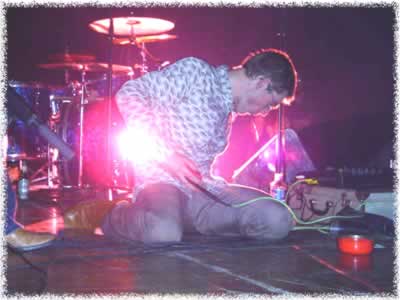 |
|
|
Aaron Moore |
I was thinking about what specific questions I should ask about different releases and I realised that this would take like the entire night, so I’ll just give you the chance to choose a few of your favourite releases from your back catalogue.
Aaron: “Classic Erasmus Fusion”
How come?
Aaron: I am on it. I think it’s the best record over all. I think doing a double album was a really good idea so we could expand a lot more. If we suffer from anything we suffer from trying to get too many ideas into too short time, on that album we were able to move around.
Nick: But also I think because the original idea for “Classic Erasmus Fusions” was almost to sort of, forgive me if I am wrong, but mop up things a bit, to a degree. But it turned to something much beyond that and just far exceeded its original idea.
Clarence: There’s a lot of stuff there that was recorded at many different times without any definite “home’, no definite album or anything, and so we got a few hours of recordings and put together the pieces that worked best within a certain time frame.
Aaron: I think this is going to be what we’re going to do more and more. We are very rarely all together.
That’s right, you are all spread out in different cities and countries these days. Where’s everyone living? You’re soon moving to the US, Aaron, and Daniel is in Glasgow.
Nick: I live in Cornwall, ten miles from the very bottom of the UK.
Clarence: I am living in three hundred different countries on and off.
How will you be dealing with this in the future?
Aaron: I can’t read the future.
Daniel: We deal with it at the moment. I mean, I come down to spend the weekend and in that weekend we can generate so much material and then go away and take bits of it. Lots of the music we make is kind of taken from bits recorded five years ago and used in a different way. We’re constantly re-using and re-working things.
Aaron: We rarely finish things in the studio, it’s put on the shelf for a year or two and then we finish it.
Nick: We’re basically just going to continue to work the way we’ve always been working and even when all of us were geographically close it still worked in a way that we would kind of record individually, as a duo, as a trio or all of us. Or someone would start a piece and another one finish it off etc. So it’s going to be no different whatsoever.
Daniel: I think my favourite record is “Idea of Wood”
Nick: I think that’s my favourite too.
Daniel: There’s a cohesion and thread to it that I like. It feels to me very much like one record. That’s also why I also like “Five Hundred Boy Piano” album. It has a consistent strong identity to it; especially some of the improvisations on “Five Hundred Boy Piano” are something I really like.
Nick: I think we really started to find what we do best with “Five Hundred Boy Piano” maybe.
Aaron: It was a live album, like we recorded what we’ve been doing on stage.
Nick: I think there are a few great things on the first few albums, I am trying to think what they’re called, like “Yak Folks Y'are” and “One Burned Ma” and “The Inhazer Decline” but they don’t work as entire albums, they’re a bit bitty, not as cohesive. Like Daniel says, I think it all came together on “Idea of Wood”. There’s a thread running through the album, from the first sound to the last sound that makes perfect sense.
Aaron: “Idea of Wood” and “Five Hundred Boy Piano” was done in one session. Different sessions but done in the studio.
Daniel: It’s the same recording environment.
Aaron: “Classic Erasmus Fusion” is such a mixed bag of various different recording sessions.
Daniel: I think it still hangs together very well.
It does. And the artwork is stunning as well. Quite a few of you are working with visual arts as well, right?
Daniel: These two especially. (points at Clarence and Nick).
Clarence: It’s good to make sounds and wrap them up in a pretty picture.
Do you think it’s the same kind of creativity,
just different outlets for the same thing?
Nick: Yeah, when I produce an illustration or a painting it’s exactly the same kind of creativity as when I am making music. It’s just different forms. It’s the same.
Clarence: I’m making short films now, sound and vision together.
Let’s head back a bit…I imagine that you do most of the work while recording in an improvised atmosphere. Do you go into your recording sessions with some kind of idea of what will come out, or is it pure improvisation?
Nick: We have ideas.
Aaron: Do we?
Nick: Sometimes. Little pieces.
Daniel: Often lately we’ve being going in with no idea of what we’re going to do, so in that sense it’s improvised. For instance we’ll record half an hour of improvisation and listening back to it we’ll find these little bits we want to work with. It’s an odd method - we improvise initially and out of that we find passages that we want to work with and do overdubs on.
Aaron: Even in the overdubs there are lots of improvisations.
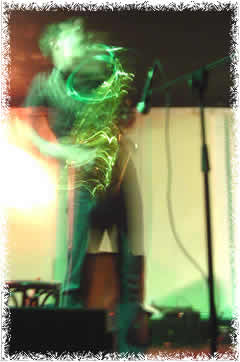 |
|
Nick Mott |
Clarence: It’s never pure anything. It’s never pure improvisations. It’s never pure composition.
Aaron: Sometimes it is pure.
Nick: It’s rare.
Aaron: It’s not rare.
Nick: For us.
Aaron: There are loads of tracks that are improvised.
Clarence: Some of the results, the things on record are purely improvised for instance.
Aaron: Like the start of “Five Hundred Boy Piano” and of ”Classic Erasmus Fusion”.
Clarence: Like Daniel says, it could work out that way but…
Aaron: There’s no magic formula. Sometimes we do this and sometimes we do that.
Daniel: That’s true but we do find certain patterns. Just that, going in recording a lot of improv and then going back to it. Sometimes it’s really just so fast. There’ll be this one little passage, “does this vocal work”, “how about this guitar” and before you know it we have this ten minute piece.
Aaron: You listen back to what you just have done and you instantly realise that’ll work. Get it in there.
Daniel: There’s often a kind of rapid composition
Nick: The more takes it take to lay down it often looses stuff.
Aaron: The more we’re trying to achieve a specific idea, the harder it gets. One track in particular we tried and tried to record and remixed and remixed and eventually we mixed it out of existence. I can’t remember what it’s called. We used to play it live and we were trying to recreate what went very well live in the first place. So if it’s not working just leave it.
Daniel: We very rarely do second takes in recording, very very rarely. If we don’t like it we’ll use it in a different context.
Do you go into a session with the idea that this is going to be a record, or is it more a matter of recording and see what happens?
Daniel: We’ll see what happens, but we also know from experience that a lot of the stuff we record one day will end up on a record once somebody does something with it.
Aaron: If we go into the studio we’re building up an archive of material.
Clarence: We recorded some great things today.
So who is putting it out?
Clarence: Don’t know yet. You are probably!?
You never know. Do you consider yourselves to be a part of any particular "scene"? Where do you think you guys fit into the larger scheme of things in the experimental music world?
Aaron: No to the scene. Where do we fit in? I don’t really think we do.
Clarence: We do. We’re here because we’re here because we’re here .There’s room for us and there’s interest and response and there is the time and energy and opportunity and so on for this to happen now ,so that’s how we fit in. People inviting us, people working with us, you talking with us now etc. etc. etc. That’s how we fit in.
Nick: In people’s hearts and minds.
Daniel: Never part of a scene. In fact I suspect that when people think we are part of a scene they’re generally disappointed because we don’t sound like they wanted us to sound. I think we sometimes make it difficult for potential new listeners because we don’t stick to any one thing.
Aaron: It’s not something we don’t do on purpose, that’s just the way it is.
How would you describe the Volcano the Bear live experience?
Daniel: It’s an experience I guess. I’ve never seen us play so…
Aaron: I think if you never have seen us play, it’s definitely not going to be what you expect. It’s theatrical.
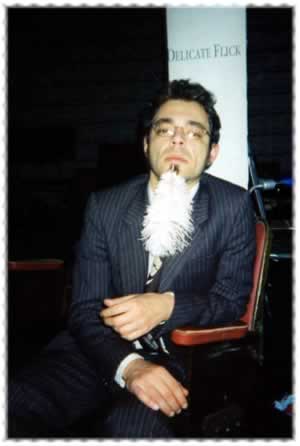 |
|
| Nick Mott: a delicate flick (yes, that's flick) |
Clarence: Sarah said it
was the best play she ever had seen. Some people say it wasn’t what they
expected, sometimes it’s not what I expected either...
Daniel: Sometimes people are surprised by how together it is. Sometimes people expect a big bloody mess. We actually know what we’re doing, even the bits we don’t know what we’re doing we still know what we’re doing.
Nick: Sometimes we’re self-indulgent
Clarence: Whatever that means.
Aaron: Everything is self-indulgent.
Daniel: I think most people, even if they don’t like the music they’ll enjoy the experience and be glad that glad they came. Some people leave, some people don’t like it. We’re used to that. We know several people that didn’t really like the music but were fascinated by the actual live experience.
I’ve seen you guys play live a couple of times now and what I find amazing is the combination of being musically overwhelmed but at the same time having such great fun. Listening to your stuff in the live situation is so much about joy and happiness. It’s really fun to see you play. Maybe this has something to do with the theatrical approach.
Daniel: That’s why we actually play.
Aaron: The theatrical approach is not something we…it’s not any kind of background in theatre or anything. But rather than stand still and play our instruments…
Daniel: I think in the very early days live we were much more static.
Aaron: But then we started swapping instruments and stuff so we had this immediate physical interaction and you come up to me and push me off the drum kit and I would come up and take the guitar from you, which you never should have given me!
Nick: I feel a bit different. For me being on stage as part of the group I think I kind of used to jump around and act like a clown. I don’t do that anymore. A lot of the early gigs I would spend much more time waving my hands in the air.
Aaron: And you were really good at that.
Daniel: It sounded great.
Clarence: We are quite calm these days actually. But on the other hand it was only last week we were performing handstands on stage and stuff like that so…
Nick: I feel calmer on stage. I used to feel completely manic when we used to do shows. I don’t know…
Does that have something to do with confidence?
Daniel: I think this theatrical approach has just naturally grown. We’ve always had fun making this music and now we’re just expressing this more than in the past. In the past I kind of felt that people would think this is stupid if we do this.
Clarence: I don’t know. Look, already at those early gigs we would be standing on stage wearing stupid masks and singing silly songs.
Nick: Big green carpet hats. Huge hats!!
Daniel: I think we were much more physically static than we are now. We might have had weird masks and massive carpet hats. Don’t you agree? Maybe it’s just me then.
Aaron: We’re kind of interactive anyway, aren’t we? We’re friends you know. Especially me and Daniel, we’re always pushing each other and trying to trip each other over.
Nick: I think the easy way to describe it is that it’s obvious that even though there’s interaction between the four of us there’s four of us, there’s a double act between Aaron and Daniel quite often. They tend to do the vast majority of the vocals and so there’s always that interaction between the two and that quite often incorporates some kind of physical interaction. Maybe I don’t share as much with that and don’t share with Clarence as much.
Aaron: Clarence punched me in Århus.
Clarence: I was hurting you, right?
Aaron: You were hurting me.
Clarence: Sorry.
Nick: There are a lot of occasions where the two of you are doing some vocal thing and quite often stood on different microphones. That’s the way I see it.
A friend of mine said that the experience of seeing you guys live reminded him of reading Samuel Beckett: surrealistic, nightmarish but also with a great sense of humour. What do you think of such a comparison?
Daniel: I don’t really know much Beckett but I like his description.
Aaron: I am hyper-ignorant when it comes to literature. I don’t read any books anymore.
Nick: Which show was he describing?
The Malmö show last spring
Aaron: That was a great show, that’s when we had all these flowers.
Clarence: We had a bunch of flowers. I won a bunch of flowers on the flight down to Malmö so we gave them to the people at the show. That was good.
Daniel: What did he say? Nightmarish…
Surrealistic but also with a great sense of humour
Daniel: I think that’s pretty good. I think there are some dark, nightmarish aspects to what we do…
Aaron: Especially when you go woohoo…
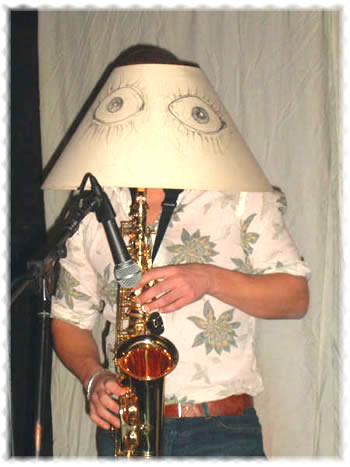 |
|
|
Nick Mott: "surrealistic but with a great sense of humour..." |
|
Another interesting thing about this show is that I know four different people that went to that show and two of them rate is as one of their favourite shows ever and the other two were like “did we got to the same show?” They just didn’t get into it.
Aaron: I think that we probably can make people feel uncomfortable about themselves.
Daniel: Not about themselves.
Aaron: If you see something that moves you in the wrong way chances are that they make you feel uncomfortable.
Daniel: Maybe they just don’t like that.
Aaron: There’s that as well but I know I’ve seen and experienced things in the past that I stand back from. Sometimes it turns out that I have a problem with that myself rather than a problem with them doing it.
Clarence: Some people like some things and other people like other things, obviously…
Daniel: We do polarise people more than a lot of other bands.
Yeah, I think so but I also think it’s right what you said before about the fact that most people will find something interesting in what you do.
Daniel: I don’t know how much I would like it. I would like to watch it.
Aaron: I am not sure I would be into Volcano the Bear either. If I was watching Volcano the Bear I would probably be feeling the way I just described. It would probably make my skin crawl. Who are these fuckers who think they can do that? Why can’t you play your instruments properly you twat?
Daniel: I think I’d like the guitar and piano playing…
How have you been received by the audiences that you have played to? Any special live anecdotes you'd wish to share with us?
Aaron: Sometimes you get like ridiculous amounts of admiration and you get people come up to you and describe an almost religious experience. But you can get a lot of indifference as well.
Daniel: This will sound cheesy and arrogant but many times people have said that they’ve never seen a show anything like that before. It has happened a lot. It sounds cheesy but it has happened so many times.
Aaron: There’s nothing arrogant about it. It’s the truth.
Daniel: But we do get a lot of strong responses.
The strangest thing would be indifference. Either you like it, you hate it or at least find it interesting.
Daniel: Interesting is always a good one. “You didn’t like it, did you?”
Clarence: I know I would like to see us if I wasn’t in us and I know I’d be into the music. I would be really pleased to get a Volcano the Bear record.
Aaron: It’s very hard to know what you look like. When we’re on stage and doing our show we don’t know what it’s like to be sitting back in the audience, to see the whole thing going from that point of view. How often do you get to see your own face? Only in the mirror. I don’t know what I look like when I am talking cause I am not talking to myself in the mirror. Well…
Not too often anyway…
Aaron: Exactly. I know what you look like really well and all your kind of little facial freakiness but you don’t know about that. You’re smiling like a brat now.
Daniel: When we played in Berlin there was a huge audience who were there to see four or five other bands and one band in particular. When we started playing there was probably like 500-600 people, we usually don’t get to play to that sort of crowd, about half of them left but the half that stayed, there was an incredible reaction and there was this guy who brought a whole lot of theatre students to watch us play. That was the lesson. And there was one girl from Latvia whose body got into a weird paralysis.
Aaron: She broke her back. It’s like when I did that flying carpet trick on stage…
Nick: It’s probably rare that it affects people on such a physical level. It’s such a unique experience. I am sure there are a lot of noise gigs that you could go to where you’d want to leave due to the physical effect.
Aaron: Most of them.
Nick: We are not a noise band. There are a few noisy elements here and there but it’s not noisy. It’s a very tiny part of what we do.
It’s funny that you mention that Berlin gig, as an e-mail friend of mine from Germany expressed how he was completely blown away by that show when he wrote to me the other day.
Nick: The Berlin show was really special for us as it was the first time it was the four of us on stage for three or four years. As you know Aaron and I have toured as a duo for a bit and these guys have been touring as a trio but the four of us to be on stage again after all that time was immensely exciting for all of us. We were headlining so the time we were going on, it was eventually about half three in the morning when we got on stage.
Aaron: Was it? You hadn’t fucking reset your time.
Nick: Well, it was very late…
Daniel: It was late and you kind of build up the tension and when we finally got on stage we exploded. I’ll tell you what’s weird. When I was about to pack back in I didn’t really think it was that great. The point for me is, for it to be a really good Volcano the Bear gig I don’t think that we necessarily have to play our instruments very well. On a purely musical level it was just all right.
Aaron: That Paris gig was hardly any music, but it was a brilliant gig.
Daniel: That’s what I mean. The relationship to the audience, the atmosphere on stage. There’s so much more.
Nick: A good example for me is that live CD-R we released. I had a terrible time at that show, I just thought everything sounded awful and the crowd was really unresponsive. Then we all listened back to it and it was fantastic. We’re not always the best judges of how it actually sounds.
And now you’re crossing the pond for the first time.
Daniel: No. We’ve played there before, in 2000. I don’t think we really had established a live performance. I think we were surprisingly conservative actually, looking back. It was very much like “we are going to do this piece and we’re going to do this piece”. It was quite a hard musical operation, for us.
Aaron: It was rubbish.
Daniel: It wasn’t rubbish.
Clarence: It was a phase we were going through.
Aaron: When we came back we didn’t do a gig for over a year.
Daniel: I left Leicester after that. I was really pissed off.
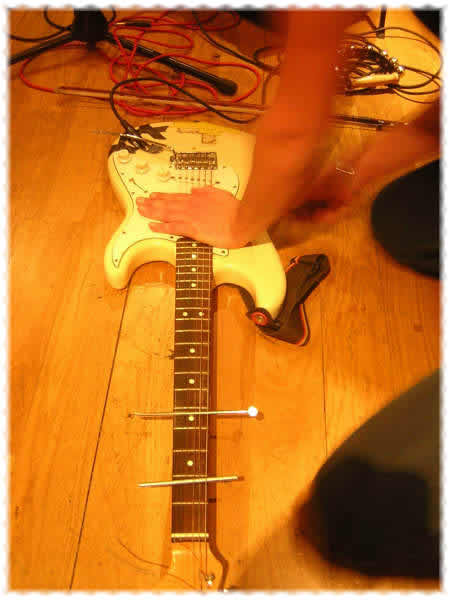 |
|
Guitar: Nick Mott |
Will this be a tour or will you only appear at the Brainwashed festival?
Aaron: We’ll do a few shows. It’s really difficult for us to sort it out and get shows. People are not really kind of biting their hands off to have us play.
I have a friend travelling from Texas for that festival so you better play a good one!
Aaron: We will play a good show; we always do even though you might not feel it’s good.
Nick: Playing shows in Europe is nearly always fantastic.
In what way?
Nick: The reception from people, the hospitality.
Aaron: When we play in England and play in America my experience is that we very rarely even get a free drink or a meal.
Nick: There are some basic simple things as food, somewhere to sleep and free drinks that will make the performers feel happy. You’re going to have a crap show if the performers not are happy.
It seems like pretty basic stuff.
Aaron: Yeah. You get paid there as well.
Nick: You get paid much better.
Aaron: We can do a gig and we don’t mind if we don’t go home with any money but it would be nice to cover your costs. Some of these gigs in America can offer you like $100 and that won’t even pay for the van rental, petrol and somewhere to stay.
What’s coming up in terms of releases?
Aaron: Volcano the Bear have a new album coming out next week.
Daniel: “Volfurten”, a limited vinyl LP.
Aaron: I’d say that “Volfurten” is our most extreme.
In what sense?
Daniel: Yeah, in what sense?
Aaron: In an extreme sense. I think it is. It’s pretty intense and very raw.
Daniel: It’s recorded in a very raw way.
Aaron: It’s mainly instrumental. And we’ve got the live album…
Daniel: What’s that?
Aaron: The Phoenix gig. And then we’ve got another live album, and another album, and after that one…
You were featured in the Wire recently. Do you feel the gospel is spreading faster these days?
Nick: Definitely. I think the first thing that really started things were the reviews of “Catonapotato” which lead on to the Wire interview, the big full-page feature.
Aaron: The new album has probably sold more than some of the previous ones in a much shorter period of time. I don’t know if it’s down to that or down to the album. I think some people even bought the album on the strength of the artwork. It’s a lovely package, the whole thing looks really nice and I think people buy records because of the package.
I think we’re all starting to get hungry and thirsty now so let’s try to wrap this up with the final question. Dreams for the future?
Aaron: A job in New York so I can pay the rent, and a successful marriage.
Nick: I am trying to be a freelance illustrator.
Daniel: I always just wanted to be able to make a living on making music and I kind of almost do that right now. So, more of the same, please.
Clarence: Stay alive and carry on doing what I am doing.
More of the same sounds good to me. Thank you guys! It’s been a pleasure.
“Volfurten” is out now on Volucan Records. Website: www.brainwashed.com/vtb
Interview by Mats Gustafsson. Directed and produced by Phil McMullen © Terrascope Online 2006. Thanks in particular to Aaron, Daniel and Laurence for their time and patience, and to Irmgard Mann for the bespoke heading.